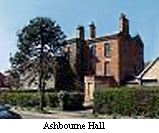The purchase of a property here in 1848 had disastrous personal consequences for Fr. Daly who made the purchase and for the nascent Oblate mission, the very existence of which it put in jeopardy.
Ashbourne in the mid-nineteenth century was a small and attractive market town in Dovedale in Derbyshire, about 15 miles from the city of Derby, with a population of around 3,300.
A number of gentry families lived in mansions actually within Ashbourne or on its immediate fringe. At the time Fr. Daly arrived on the scene, however, many of these residences owned by the old families were being vacated for one reason or another. The property purchased by Fr. Daly – Ashbourne Hall – was one such property. Close to the town on its east side, a few hundred yards from the east end of Saint John’s Street, it was a late Georgian mansion standing in extensive grounds overlooking a park landscaped with clumps of trees and a small ornamental lake. After the death, in 1846, of Sir William Boothby, the 8th baronet, the Hall and park with its small agricultural estate were put up for sale. John Fox, a local solicitor, bought the whole property as a speculation, selling it off in 46 separate lots. Attracted by its eminent suitability as a novitiate for the mission, Father Daly impulsively purchased the Hall itself for ‘a relatively large sum’, which he hoped to raise from friends. On 17 April 1848 he wrote to inform the Founder of this who immediately sent Fr. Aubert to investigate. On August 7, 1848, Fr. Aubert was named superior of the new house. However, on 18 October 1848 Fr. Charles Bellon was named superior of the house and in the same document the house was declared to be the headquarters of the English mission. The property served as a novitiate for a short period. The novices were sent here from Penzance and were then transferred to Market Weighton. When the Founder drew up his Act of Visitation of the Province of England in Maryvale on 22 July 1850, he does not mention the house of Ashbourne: he says simply that the local people there are now served from Maryvale which had now become in effect the central house of the English mission. When Father Daly proved unable to find the purchase money, the property reverted to Fox who eventually resold it in 1858.
Michael Hughes, o.m.i.

